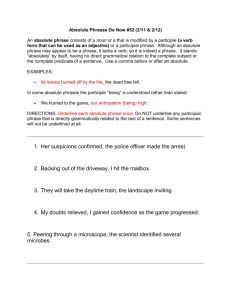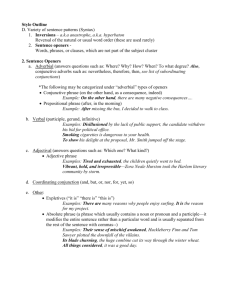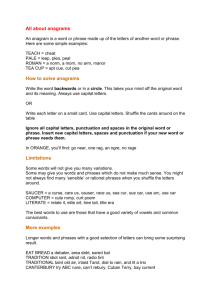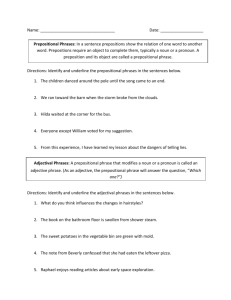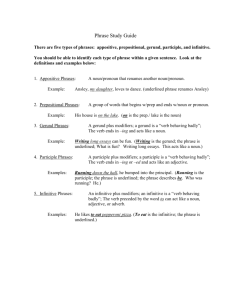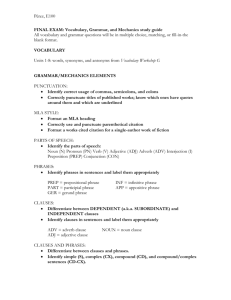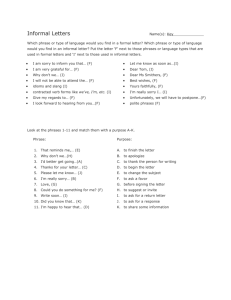Absolute Phrase - jeffrey scott longstaff
advertisement
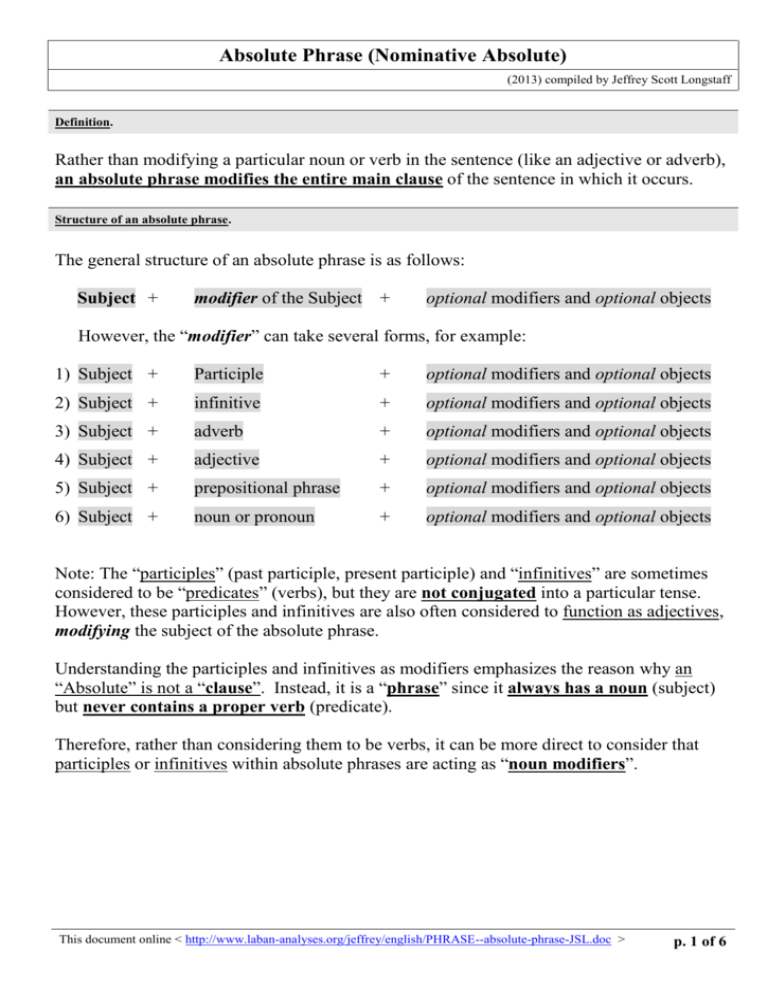
Absolute Phrase (Nominative Absolute) (2013) compiled by Jeffrey Scott Longstaff Definition. Rather than modifying a particular noun or verb in the sentence (like an adjective or adverb), an absolute phrase modifies the entire main clause of the sentence in which it occurs. Structure of an absolute phrase. The general structure of an absolute phrase is as follows: Subject + modifier of the Subject + optional modifiers and optional objects However, the “modifier” can take several forms, for example: 1) Subject + Participle + optional modifiers and optional objects 2) Subject + infinitive + optional modifiers and optional objects 3) Subject + adverb + optional modifiers and optional objects 4) Subject + adjective + optional modifiers and optional objects 5) Subject + prepositional phrase + optional modifiers and optional objects 6) Subject + noun or pronoun + optional modifiers and optional objects Note: The “participles” (past participle, present participle) and “infinitives” are sometimes considered to be “predicates” (verbs), but they are not conjugated into a particular tense. However, these participles and infinitives are also often considered to function as adjectives, modifying the subject of the absolute phrase. Understanding the participles and infinitives as modifiers emphasizes the reason why an “Absolute” is not a “clause”. Instead, it is a “phrase” since it always has a noun (subject) but never contains a proper verb (predicate). Therefore, rather than considering them to be verbs, it can be more direct to consider that participles or infinitives within absolute phrases are acting as “noun modifiers”. -This document online < http://www.laban-analyses.org/jeffrey/english/PHRASE--absolute-phrase-JSL.doc > p. 1 of 6- Recognizing absolute phrases. Many absolute phrases can be easily recognized because they could be changed into an independent clause by adding one verb (for example: “is”, “was”, or “were”). In a few other cases, when the word “being” is used in the absolute phrase, it can be changed into another form of “to be” (such as “is”, “was”, or “were”) to create an independent clause. Sometimes the word “having” is used before a past-participle (for example “having ended”). This can be identified as an absolute phrase if it can be converted to an independent clause by changing the word “having” into another one of its forms (such as “had” or “has”). Conversely, an independent clause can often be turned into an absolute phrase by: - deleting a linking verb within the sentence, or - changing a main verb into a present participle (-ing) Special issues in recognizing absolute phrases – 1) Absolute phrase or noun phrase?. It might be difficult to judge if the phrase is an “absolute” or a kind of “noun phrase” 1) John loved my new style, my long red scarf wrapped around my neck and waist. - This is a noun phrase (appositive) because it is re-naming “my new style”. - “My long red scarf” is another name for “my new style”. - The modifier (“wrapped around my neck and waist”) is NOT essential. 2) I walked into the storm, my long red scarf wrapped around my neck and waist. - This is an absolute phrase because it is adding general information. - The modifier (“wrapped around my neck and waist”) IS essential. Special issues in recognizing absolute phrases – 2) Absolute phrase or prepositional phrase?. Rarely, it is claimed that an absolute phrase can begin with the preposition “with” (Stewart, Don). However, this might be considered to change the phrase into a prepositional phrase. Location within a sentence. An absolute phrase usually occurs at the beginning or the end of a sentence. Considered to be “non-essential” (it can be deleted and the sentence will still make sense), an absolute phrase is separated from the rest of the sentence with commas. -This document online < http://www.laban-analyses.org/jeffrey/english/PHRASE--absolute-phrase-JSL.doc > p. 2 of 6- Examples of Absolute Phrases Absolute phrases with present participles. This might be the most common type of absolute phrase. - Her heart beating rapidly, Susan rose to her feet and began speaking to the audience. The food smelling terrible, we threw it in the trash. David’s eyes squinting in the intense sunlight, he closely watched the ants at their work. Weather permitting, we will go to the beach tomorrow. - We fell to the floor, tears pouring from our eyes, as we remembered our departed friend. - The long-distance runners came past, determination showing in their faces. - She ran all the way to the playground, her friends following. - We held tightly onto the high-speed motorcycle, our blood pulsing with excitement. - She sat high up in the mighty tree, its branches reaching to the sky like a great giant. - The children returned home, their faces showing the excitement an adventurous day. - The restaurant was out of food. That being so, we had to look for somewhere else to go. All else being equal, the simplest explanation is the most likely to be true. There being no one to give us a ride, we had to walk home. The table being broken, we decided to fix it. That house being where I was born, I was sad when it burned down. He being poor, and I being rich, everyone listened to me, but none to him. - He would often drink before driving his car, the result being a terrible accident. He would practice often, the result being that he became an excellent player. - All our guests having left, we finally had time to be alone together. John having passed his civil servant exam, we began planning for his future career. His classmates having elected him president, he set about telling everyone what to do. His first marriage having ended in divorce, he swore to remain single forevermore. The sergeant having first given a demonstration, we all started to march. - They renovated their entire house, John fixing the stairs, Mary painting the walls. - The exterior of the house was painted white, this color pleasing the neighbors. - Their son ran wildly from room to room, his behavior a little worrying to his parents. - We ran around the track eight times before bed, this tiring us completely. - Beautiful Miss Julie, her face blushing, accepted the ring from her future husband. -This document online < http://www.laban-analyses.org/jeffrey/english/PHRASE--absolute-phrase-JSL.doc > p. 3 of 6- Absolute phrases with past participles. - - His heart broken, he left the room quietly. Her spirit awoken, Julie felt she could do anything. All things considered, I decided that job was not the best choice for me. That done, we continued to the next thing. All told, we worked for 180 hours this month. [“all told” = all counted] His clothes soaked from the rain, shivers were running up and down his spine. - They walked through the dark alley, each one lost in a private little world. - The tired soldier crawled to safety, his body exhausted from the struggle. - A group of poor children ran up to us, their hands extended in hope and longing. . [Is this last example two independent clauses, or is the latter part an absolute phrase?] Note: Using a past participle in an absolute phrase can be potentially misleading. If the verb’s simple past has the same form as that verb’s past participle, then using the past participle after a noun might appear to be an independent clause (rather than just a phrase). For example, the past participle of the verb “to open” is “opened”. Using this in an absolute phrase could produce: “Julie’s spirit opened” which looks the same as an independent clause (it could be a full sentence). Thus, special care should be taken when using past participles in absolute phrases. Absolute phrases with infinitives. - We borrowed a lot of money for our new car, this debt to be paid within two years. - He left work early that night, much more work still to be done tomorrow. - He planned a trip, he himself to buy the supplies, Susan to pack their clothes. - . [“he himself” – “he” or “her” can not be used alone in an absolute phrase.] Absolute phrases with an adverb. The participle “being” (or another participle?) can be considered to be omitted (but could also be inserted). [question: are these “adverbs” actually prepositions? – need more examples of adverbs] - Julie’s keys inside, she was locked out of her car. Julie’s keys being inside, she was locked out of her car. - The dog outside, we could eat in peace. Julie’s keys forgotten inside, she was locked out of her car. Julie’s keys forgotten inside the car, she was locked out. Julie’s keys inside the car, she was locked out. The dog sleeping outside, we could eat in peace. (adverb? or preposition?) (present participle) (past participle) (past participle + prepositional phrase) (prepositional phrase) (adverb? or preposition?) (present participle) -This document online < http://www.laban-analyses.org/jeffrey/english/PHRASE--absolute-phrase-JSL.doc > p. 4 of 6- Absolute phrases with an adjective. The participle “being” (or another participle?) can be considered to be omitted (but could also be inserted). - His clothes dirty, Jack took a shower and changed before visiting his friends. His clothes being dirty, Jack took a shower and changed before visiting his friends. - The game over, we all went out for dinner. The game being over, we all went out for dinner. - My eyes bigger than my stomach, I ordered too much at the restaurant. My eyes being bigger than my stomach, I ordered too much at the restaurant. - Their long bodies sleek against the sky, the herons glided overhead. His head high, William accepted the award for poetry. - My grandparents sat nearby, their faces wise with experience, their eyes clear with sight. - The mountain climber rested, his breath white in the frosty cold air. - Tim ate a quick breakfast and ran off to school, his mouth still half full of food. - He knocked at her door, every nerve tight with expectation. - The world was turned upside down. (common phrase, so no comma is used) Everything upside down, we were completely disoriented. (adjective) “upside down” = “The upside is down.” - As absolute clause: “The upside being down” or “Upside down” Absolute phrases with a prepositional phrase. The participle “being” (or another participle?) can be considered to be omitted (but could also be inserted). - Our feet near the fire, we felt warm and romantic. Our feet resting near the fire, we felt warm and romantic. (prepositional phrase) (present participle) - The gasoline in the car, we were ready for our trip. The gasoline being in the car, we were ready for our trip. (prepositional phrase) (present participle) - A dog came into the room, his shoulders strangely out of line with the rest of his body. She stood quietly in the darkness, her mind in a distant place. - The old dog looked quite amusing, hat on head, pipe in mouth. - We finally met face to face. Face to face, we finally met. (pronoun “his” omitted) [JSL – I’m not sure about this one – what grammar is “face to face”?] [JSL - “to face” - is it a prepositional phrase, or an infinitive verb?] Absolute phrases with the possessive pronoun omitted. In some cases, the possessive pronoun (his, my, our, their, her, your...) can be omitted. - Heads up, eyes open, faces full of excitement, the dogs ran to their master. - Their heads up, their eyes open, and their faces full of excitement, the dogs ran to their master. - Eyes gazing downward, John slowly admitted his crime. - His eyes gazing downward, John slowly admitted his crime. -This document online < http://www.laban-analyses.org/jeffrey/english/PHRASE--absolute-phrase-JSL.doc > p. 5 of 6- Absolute phrases with a noun or pronoun as the object. The participle “being” (or another participle?) can be considered to be omitted (but could also be inserted). - His heart a heavy weight, he slowly walked home. His heart being a heavy weight, he slowly walked home. - Her heart his, she said “yes” to the proposal of marriage. Her heart being his, she said “yes” to the proposal of marriage. - .John his best friend, William looked forward to many happy times together. - .John remaining his best friend, William looked forward to many happy times together. Absolute phrases – Some common expressions which are “considered” to be absolute . Some special expressions might be “considered” absolute since they are commonly used in a way that modifies the entire main clause of the sentence, rather than modifying just one word. - _______ speaking, .... Financially speaking, we should not invest in that project. Technically speaking, these do not follow the exact form of absolute phrases. Generally speaking, we call them “absolute” since they are used that way. Practically speaking, the use of language, not rules, determines what is “correct” It was an interesting movie, artistically speaking. - Speaking of _____, ..... Speaking of hamburgers, I’m hungry! Speaking of music, have you heard that new song? Speaking of absolute phrases, I think they can be very beautiful! - Judging by _____, ..... Judging by the look on your face, I think maybe you have had enough. Judging by the crowd at that restaurant, their food must be good! It is going to rain today, judging by those dark clouds. - . . . . . , to say the least. They were disappointed about their holiday, to say the least. (Implies they were very angry) The food was not so good, to say the least. (Implies that the food was extremely terrible) She is excited, to say the least! (Implies more - that she may be incredibly excited) They are in love, to say the least. (Implies more - that they are totally madly in love) Sources consulted. Canadian Government Translation Bureau, Language portal of Canada, Gateway to English <http://www.noslangues-ourlanguages.gc.ca/bien-well/fra-eng/grammaire-grammar/absolu-absolute-eng.html> (Accessed Oct. 2013) Nordquist, R. About.com Guide < http://grammar.about.com/od/basicsentencegrammar/a/sbabsolutephr.htm > (Accessed Oct. 2013) Solomon, Martha. (1975). Teaching the Nominative Absolute. College Composition and Communication, Vol. 26, No. 4 (Dec.), pp. 356-361Published by: National Council of Teachers of English < http://www.jstor.org/stable/357086 > (Accessed Sept. 2013) Stewart, Don. Strata Writing: < http://writing123.com/day/absolute-phrase/ > (Accessed October, 2013) University of Purdue, USA, writing laboratory; “OWL”: < https://owl.english.purdue.edu/owl/resource/965/01/ > < https://owl.english.purdue.edu/owl/resource/607/02/ >< https://owl.english.purdue.edu/owl/resource/607/03/ > (Accessed October, 2013) Youngstown State University, Ohio USA: < http://people.ysu.edu/~tacopeland/Writing/Absolutes1.htm > (Accessed October, 2013) -This document online < http://www.laban-analyses.org/jeffrey/english/PHRASE--absolute-phrase-JSL.doc > p. 6 of 6-
